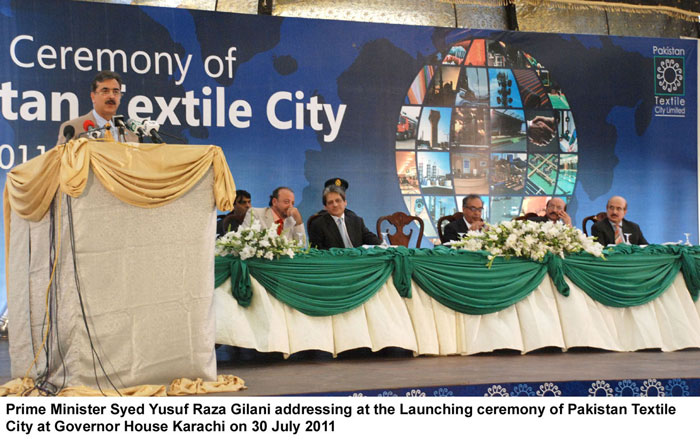China, Turkey, Korea firms show interest in investing in textile city: PM
KARACHI, July 30 (APP): Prime Minister Syed Yusuf Raza Gilani has said here on Saturday that Chinese, Turkish and Korean businesses have shown an initial interest in investing in Pakistan’s textile city. He was speaking at the launching of sale of plots to textile entrepreneurs in Pakistan Textile City, Port Qasim, held at Sindh Governor House here Saturday. Sindh Governor Dr. Ishrat-ul- Ebad Khan, Chief Minister Syed Qaim Ali Shah, Federal Textile Minister Makhdoom Shahabuddin, provincial ministers, legislators and leading businessmen were also present on the occasion.
He said Pakistan must take full advantage of the opportunities that are globally available in textile sector.
The Prime Minister underlined the need for improving skills of labour force to enhance their productivity, improve the quality of products, business practices and corporate governance to take due share in global textile business.
Gilani said that while the government was responding to the demands of textile industry by providing relief packages, the industry in turn should respond by assuring the implementation of quality standards and good business practices so that the benefits are not short, but of long term.
“I invite the textile community of Pakistani businessmen and investors to come forwards and avail the world class infrastructure facilities offered at textile city”, he remarked.
Syed Yusuf Raza Gilani said it was the duty of both the government and the entrepreneurs to be part of Pakistan’s march towards becoming the hub of quality textile products.
He pointed out that the textile sector plays a significant role in Pakistan’s economy and constitutes 60 percent of the country’s total exports and provides jobs to 40 percent of total workforce.
He noted that the removal of World Trade Order (WTO) has opened business opportunities for the global textile sector. The regional textile exporting countries like China, India and Bangladesh have significantly increased their market share while Pakistan is yet to capitalise on these opportunities.
Prime Minister Gilani said Pakistan was blessed with natural resources like cotton crop, unique geo-political location, rich history of quality textile products and a large labour force to place itself as a global leader in this sector.
Identifying the problems facing the industry, he said these are low skilled labour, power shortage and above all inadequate infrastructure. The Infrastructure development, therefore, is critical for the growth and serves as a catalyst for generating economic activities, he observed.
The Prime Minister stated that absence of reliable infrastructure offering uninterrupted supply of utilities has been one of the major causes of decline in textile exports specially value added items in the post-WTO era.
“It is imperative to offer the textile sector modern and reliable infrastructure at par with international standard”, the Prime Minister said.
Pakistan Textile City, he said, has been established as a bench mark industrial zone for providing state-of-the-art infrastructure to the value added textile sectors.
Once fully operational, it would increase our exports significantly as more than 277 new units on 1250 acres will be established in the textile city, he observed.
Moreover, it will provide an ideal synergistic environment for local industrialists to join hands with international partners for establishing joint ventures and benefit from strategically located facility at Port Qasim.
Counting some of the benefits of Textile City to Pakistan’s economy, Prime Minister Gilani said it will provide direct employment to over 80,000 people at its full capacity. It will attract an investment of $ 250 million in value added textile sector and increase the country’s exports by over $ 3 billion per annum, he noted.
Gilani said that other benefits will include generation of additional demand for cotton, yarn and crop, increased demand for cement, steel and construction material.
This will also increase revenue for movement of goods and transport activities and creation of large number of indirect jobs during the construction stage, he opined.
The Prime Minister pointed out the government has realised that we need to create an investors’ friendly environment to encourage economic development with special focus on skill development productivity, quality assurance and compliance need.
Today, he said, market share depends greatly on price and quality advantages driven by efficiency. Pakistan textile city will allow entrepreneurs to focus on developing skills in the manufacturing and marketing of their quality products. They will not have to worry about matters such as water supply, power outages and security, he observed.
Earlier, Minister for Textiles Makhdoom Shahabuddin in his address said that the government was establishing three garment cities in Faisalabad, Lahore and Karachi.
While Faisalabad garment city has been operational, Lahore garment city will be operational this year. About 300 acres of land has been acquired for Karachi garment city, he added.
He said Rs 17 billion have been disbursed under various schemes for the textile sector.
Chief Executive Officer of Pakistan Textile City Zaheer A. Hussain said that the launch of sale of plots was a land mark achievement.



 31-07-2011 14:06:25
|


